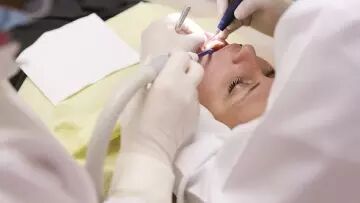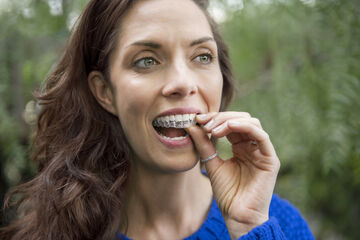Sensitive teeth can occur when you eat or drink cold food or when cold air catches your teeth. It is also possible to have sensitivity from sweet or acidic food and drinks.
The sensitivity can be in the form of a mild twinge or severe discomfort which may last several hours. Many people can suffer from sensitive teeth and it can happen at any age.
Causes of Sensitivity
Our teeth are all protected by enamel, when this enamel wears or breaks away, exposing.……
the dentine below the tooth can become sensitive. The most common area for this is along the gum line.
There are a number of things that could lead this to happen, including:
Toothbrush abrasion, Acid erosion and Tooth Grinding — these all cause the enamel to be worn away exposing the sensitive dentine underneath
Gum Recession and Gum Disease — can cause sensitivity where the roots of teeth become exposed. The roots are not covered in protective enamel and are therefore more sensitive.
Treatment
There are a number of different toothpastes on the market designed to treat sensitivity. You should use these twice a day and it may also be helpful to rub the toothpaste into the teeth and gums for added effect. It is important that you make sure you keep brushing your teeth regularly or the problem will get worse. It will take some time for the treatment to take effect and the effects will only work for as long as you continue to use the toothpaste. Your dentist will be able to advise you on the best toothpaste for your needs.
You may find that certain food and drink can bring on sensitivity so these are best avoided where possible.
If you have tried a sensitive toothpaste and are not experiencing any benefit after three weeks, book an appointment with your dentist and they will be able to ascertain whether there are any other causes of your sensitivity.
It may be necessary for teeth to be treated with fluoride gels or varnishes or for small areas to be filled to ensure that the dentine does not remain exposed and continue to cause distress. In the most serious cases it may be necessary for the tooth to be root filled.
Prevention
- Brush your teeth twice a day with a fluoride toothpaste. Use small circular movements with a soft to medium bristled brush.
- Change your toothbrush every 2 – 3 months or sooner if it is worn
- Try to reduce your intake of sugary and acidic foods and drinks to meal times
- If you grind your teeth, discuss whether a mouth guard would be suitable for you
If you need any more information or advice on treating sensitivity do not hesitate to call Leigh Dental Centre on 01702472929 and book in for a consultation.
Contact us to make an appointment
Exclusive Offer
Airflow stain removal from our hygienist


How can Botox be used to treat bruxism?
15.11.2023

Replacement for a Missing Tooth
04.11.2023
Time for you perfect smile?
Book your consultation today
When visiting our practice you know you are visiting the dental professionals trained to the highest standards. You are greeted by our welcoming staff, who share the same aim, to make your visit with us as comfortable and stress free as possible.





